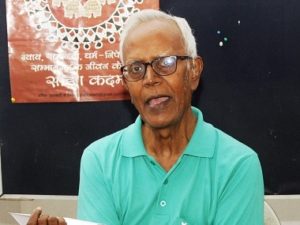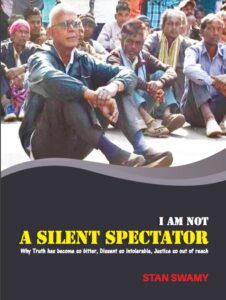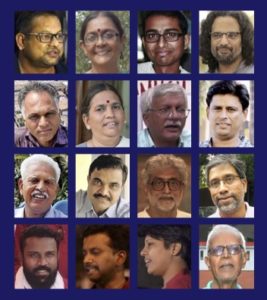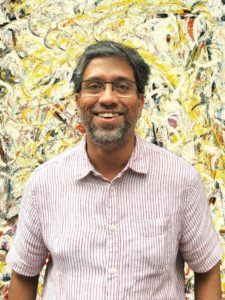
“Adivasis lost a great servant,” tribal rights activist Father Stan remembered
06/07/2021
TwoCircles.net / by Sami Ahmad
Stanislaus Lourduswamy, popularly known as Stan Swamy, was an Indian Roman Catholic priest, a member of the Jesuit order, and a tribal rights activist for several decades. Arrested in the Elgaar Parishad case in 2020, Father Stan Swamy breathed his last in a Mumbai hospital. Doctors at Holy Family Hospital, Bandra, informed the Bombay High Court (on 5th of July) that Swamy passed away around 1.30 p.m. In this obituary, Father Stan is remembered by those who knew and worked with him for decades.
Read more

I am not a Silent Spectator – Why Truth has become so bitter, Dissent so intolarable, Justice so out of reach
An Autobiographical Fragment, Memory and Reflection
Indian Social Institute, Bangalore / by Stan Swamy
Edition: Aug 2021
Publisher: Indian Social Institute, Bangalore
Language: English
Paperback: 149 pages
Access a free PDF copy of the book here
Who is Stan Swamy?
By India Civil Watch
On the morning of August 28, 2018 Maharashtra police raided the one room home of Fr.Stan Swamy, who lives on the outskirts of Ranchi on Bagaicha campus, under suspicion of him being involved in the violence at Bhima Koregaon. The police confiscated his laptop, mobile phone and several CDs, and a recent press release on the Pathalgadi movement by Women against Sexual violence and State repression (WSS).
What does an 82 year old Jesuit priest has got to do with Bhima-Koregaon case? Everything, if he is a stalwart of people’s causes.
“When I decided to join the Jesuits, I sought to know where I will be needed more. I came to know about the Indigenous Adivasi people in central India and I lived in an interior Adivasi village for two years and came to appreciate their values … sense of equality, cooperation, sharing without counting, community-bond, consensus decision making, closeness to nature etc. At the same time, I saw how these beautiful people were being exploited and oppressed by unscrupulous outsiders. I wanted to make something of my life that would make even a small difference in their search for dignity and self-respect. That’s what I am still trying to do during the last four decades.“ (Stan Swamy)
This life defining decision has put Stan Swamy in the forefront of struggles that ranged from the right to food to anti-displacement movements to protests against false imprisonments to land alienation.
Stan Swamy, who moved to the Chaibasa area of undivided Bihar in the 1970s, embarked on life of activism by associating with the 1996 campaign led by the Jharkhand Organisation Against Uranium Radiation (JOAR), a campaign against Uranium Corporation India Limited that successfully stopped the construction of a tailing dam in Chaibasa which, if constructed, would lead to the displacement of adivasis in Jadugoda’s Chatikocha area. After vociferously raising these issues, he moved to work with the displaced people of Bukaro, Santhal Parganas and Koderma and has continued to work for them. He has been a vocal critic of the government’s attempts to amend land laws and the land acquisition act in Jharkhand, termed as ‘Land Bank’, which he sees as the most recent plot to annihilate the Adivasi people and a strong advocate of the Forest Rights Act, Panchayat Extension to Scheduled Areas (PESA), Tribes Advisory Council (TAC), Samatha Judgement etc.
In 2010 Stan Swamy published a book titled, ‘Jail Mein Band Qaidiyon ka Sach’ exposing the arbitrary and unlawful arrests of tribal youths with alleged links to the Naxal Movement. In his book, he highlighted that the average monthly income of 97 percent of these tribal households was less than Rs 5,000, which meant they simply could not afford to hire lawyers to take up their cases. In 2015 when a report was published discussing the plight of the arrested youths, Stan Swamy came into the State machinery’s radar. According to the report 98% of the 3000 arrested were falsely implicated and had no links to the Naxal Movement. Some served years in jail without a trial. He has selfless contributed to pay for the youth’s bail bonds and approached lawyers to represent these cases in the court of law. As part of the Persecuted Prisoners Solidarity Committee, Stan Swamy along with Sudha Bhardwaj, has questioned the illegality with which some undertrials have been put in solitary confinement following the banning of Mazdoor Sangathan Samiti in December 2017.
Working tirelessly to have the PESA Act implement in the state’s scheduled areas, his efforts culminated in the Pathalgadi movement in 2017 in the districts of Khunti, Simdega, Seraikela and Gumla in Jharkhand. The government’s response was to try and suppress the movement by booking around 20 leaders, including Father Swamy, under charges of sedition on 30 July 2018. It led to well-known intellectuals and activists like Vasvi Kido and Santosh Kido describing the government action as a witch hunt and an attempt to malign the image of the Church in Jharkand. It is hardly a secret that Chief Minister Raghubar Das and the BJP are keen to check the Church’s influence among the tribal community.
As testimony to his tireless endeavours to retain the secular fabric of the country, Stan Swamy has also been closely engaged in fostering communal harmony through secular platforms like Sajha Kadam.
He founded of Vistapan Virodhi Janvikash Andolan (VVJA), an all India platform for different movements that are campaigning against human rights violations caused by displacement of adivasi people, dalits, and farmers from their lands.
As a writer and with meticulous documentation skills he laid threadbare several of the government’s anti-people policies.
India Civil Watch
Facebook: https://www.facebook.com/indiacivilwatch/
Twitter: https://twitter.com/indiacivilwatch
E-mail: indiacivilwatch at gmail.com
By Jhakhand Janadhikar Mahasabha
Stan Swamy wrote at least 74 articles, notes and books in the last two decades on several questions including land rights, undertrials, Adivasi rights, fifth schedule and PESA, hunger and development model. Always vocal on peoples’ issues.
See list of Articles, notes and books written by Stand Swamy (1999-2020)











